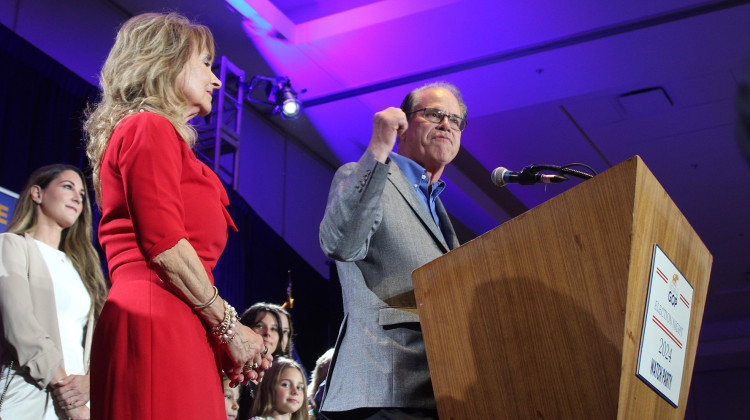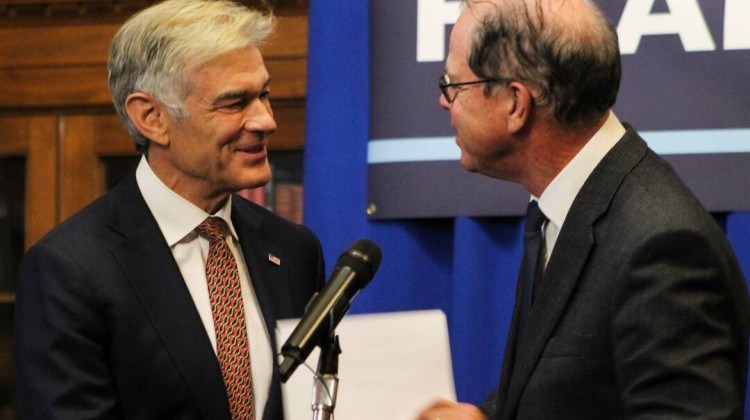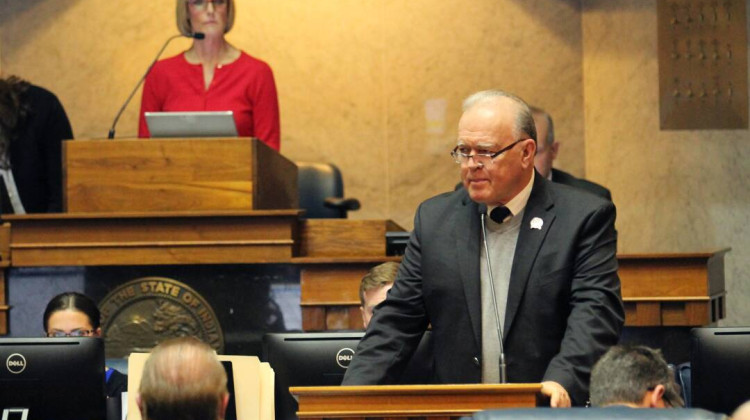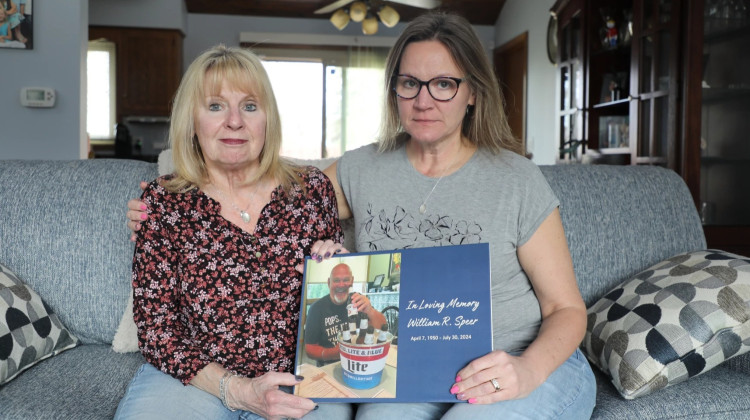
Abortion access wasn’t on the Indiana ballot, but advocates on both sides hoped winning candidates could work to influence the state’s reproductive health laws including the abortion ban. Republican Mike Braun praised Indiana’s abortion ban during debates in the lead up to the General Election.
Farrah Anderson / WFYIRepublican Mike Braun will be Indiana’s next governor on January 13, after beating Democratic candidate Jennifer McCormick with nearly 55% of votes.
Abortion access wasn’t on the Indiana ballot, but advocates on both sides hoped winning candidates could work to influence the state’s reproductive health laws including the abortion ban.
Indiana was the first state to pass a law banning abortion after Roe v. Wade was overturned in 2022. Currently, Indiana outlaws almost all abortions with limited exceptions including if the health and life of the mother is at serious risk, if there is fatal fetal abnormality but only up to 22 weeks of pregnancy and in cases of rape or incest but only up to 12 weeks of pregnancy.
Abortion rights were one of the central issues in this year’s race for Indiana governor.
Braun praised Indiana’s abortion ban during debates.
"We’re a right-to-life state, backing the sanctity of life,” Braun said during a debate. "When our legislature took it on they talked to their constituents, to Hoosiers. It has withstood the courts weighing in."
McCormick, on the other hand, opposed the ban and wanted legislators to add a state constitutional amendment to protect abortion rights. She ran on, what her campaign called, a "Commonsense Abortion Rights Plan."
Some abortion rights advocates hoped McCormick could turn this around if elected.
A survey of 1,275 Indiana registered voters showed that about 58% believe the state’s abortion ban is too restrictive, according to a poll commissioned earlier this summer by Our Choice Coalition, a pro-abortion rights political action committee. The poll also shows that 64% believe abortion should be legal in all or most cases, and 70% were less likely to support incumbents who voted for the abortion ban.
Tracey Wilkinson, a physician and board member for the health care advocacy group Good Trouble Coalition, is concerned that the limited exceptions in Indiana’s abortion ban could go away or that access to birth control and other medical rights could be on the line. She also worries about a potential federal abortion ban now that President-elect Donald Trump will be in power and Republicans will control the U.S. Senate.
"Those exceptions for rape and incest, as well as fatal fetal anomalies, are really important for the handful of people that qualify in our state,” she said, “and I think that the anti-abortion extremists in our state are very clear that they don't really like those exceptions."
Across the country, 10 states voted on the future of abortion during the 2024 election.
In the Midwest, Nebraska had two proposals on the ballot: One would allow abortion until fetal viability, and the other would reaffirm the state’s 12-week abortion ban. Voters backed the latter, which preserves the state’s abortion ban and opens the door for lawmakers to further restrict abortion access.
On the other hand, Missouri voters approved an amendment that would guarantee access to abortion until the fetus could survive outside of the uterus –– typically around 24 weeks of pregnancy. This vote does not automatically overturn Missouri’s ban, but it paves the way for abortion rights advocates to go to court and ask to overturn it.
But the legal process can be lengthy and may take months or even years before people see an actual change in their ability to access services.
"I think it's always helpful when states that we can drive to have abortion access. But I am truly worried about a federal abortion ban following the federal election results," Wilkinson said. "So, I worry about what all of these states with access will look like when a federal abortion ban is in place."
Haley Bougher, Indiana state director for Planned Parenthood Alliance Advocates, relayed similar concerns. She said Indiana is failing to protect residents by forcing people to cross state lines in order to access essential care, and overwhelm the health care systems in neighboring states.
"Mike Braun’s victory signals an even graver threat to our lives and our reproductive futures in Indiana,” wrote Bougher in an email to WFYI. "His refusal to safeguard essential care — like IVF and birth control — and his support for a near-total abortion ban puts Hoosiers at risk of losing even the narrowest legal avenues to access abortion."
But Mike Fitcher, the president of the anti-abortion rights advocacy group Indiana Right to Life, said the election results and Braun’s win are defining statements on the strength of "pro-life" support in Indiana.
“We are proud of the pro-life voters who turned out in force today, and we look forward to working with governor-elect Braun to make Indiana a model state in supporting pregnant mothers and protecting unborn babies,” Fichter said.
Contact WFYI’s health reporter Elizabeth Gabriel at egabriel@wfyi.org.
Side Effects Public Media is a health reporting collaboration based at WFYI in Indianapolis. We partner with NPR stations across the Midwest and surrounding areas — including KBIA and KCUR in Missouri, Iowa Public Radio, Ideastream in Ohio and WFPL in Kentucky.
 DONATE
DONATE






 Support WFYI. We can't do it without you.
Support WFYI. We can't do it without you.